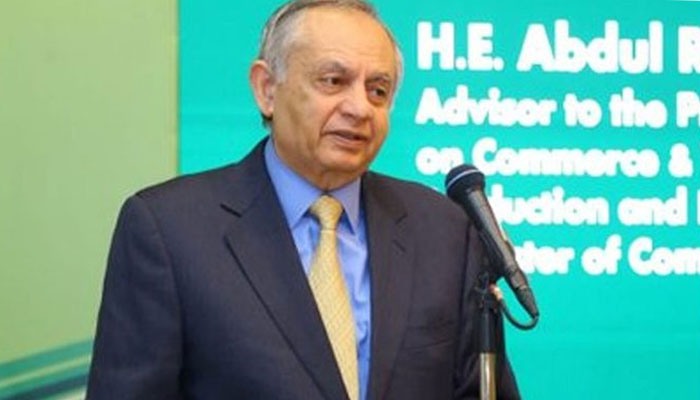Pakistan aims high with trade hub plan
ISLAMABAD: Pakistan focuses on leveraging its geo-economic location to transform into a trade and transit hub for goods destined to Afghanistan and central Asian republics, commerce adviser said on Saturday.
Adviser to Prime Minister on Commerce on Investment Razak Dawood said the government wants to make Pakistan a hub for trade, transit and transshipment for Afghanistan and central Asian republics (CARs).
“Our trade must be based on secure, open, consistent, reliable and legal movement of goods at the Afghan border along with enhanced connectivity with Afghanistan and CARs,” Dawood said in a twitter message. “This is a long-term vision and, through our current engagement with Afghanistan and Uzbekistan, we are laying down the foundation for its implementation.”
The landlocked Afghanistan relies on products’ inflows from Pakistan to meet its consumer needs. Pakistan is also used as a transit corridor for supply to the neighbouring country, fetching revenues for the tax authorities. Around 10,000 containers of Afghan transit trade land at Pakistan’s port every month.
Dawood said Pakistan planned to leverage its geo-economic location in the region to enhance its international trade. The government is currently engaged with Afghan government and work on revision of the Afghanistan-Pakistan transit trade agreement is in final stages, while negotiation on preferential trade agreement is also underway, according to the commerce ministry. The decision is expected this month.
High transit and transportation cost is a real barrier in the transit trade with only National Logistics Cell allowed to handle Afghan transit. This is against competition and keeps transport fares at the higher side, said an analyst.
Permission to private transporters for Afghan Transit will promote fair market practices and bring down transport fares, he said.
State-run Trade Development Authority of Pakistan (Tdap) agreed that the cross-border trade slowed in the recent past due to strict monitoring and increasing cost of transit and bilateral trade. The volume of trade between Afghanistan and Pakistan has slumped to less than $1 billion from $3 billion in the past.
Tdap said a key concern for the stakeholders is higher transit cost with Afghanistan that is shifting to other neighbouring countries like Iran that offers competitive rates, better consignment handling facilities and cost-effective transportation.
“High cost of transportation and hefty deposits by shipping companies for transportation containers are discouraging Afghan importers to deal with Pakistan,” Tdap said in a report last year.
-
 New Guest Host Announced For The Kelly Clarkson Show
New Guest Host Announced For The Kelly Clarkson Show -
 Why Prince William’s Statement Over Jeffrey Epstein ‘says A Lot’
Why Prince William’s Statement Over Jeffrey Epstein ‘says A Lot’ -
 Paul McCrane Reveals Why Playing Jerks Became His Calling Card
Paul McCrane Reveals Why Playing Jerks Became His Calling Card -
 Prince William, Kate Middleton Thrashed For Their ‘bland’ Epstein Statement
Prince William, Kate Middleton Thrashed For Their ‘bland’ Epstein Statement -
 Bad Bunny Stunned Jennifer Grey So Much She Named Dog After Him
Bad Bunny Stunned Jennifer Grey So Much She Named Dog After Him -
 Kim Kardashian's Plans With Lewis Hamilton After Super Bowl Meet-up
Kim Kardashian's Plans With Lewis Hamilton After Super Bowl Meet-up -
 Prince William Traumatised By ‘bizarre Image’ Uncle Andrew Has Brought For Royals
Prince William Traumatised By ‘bizarre Image’ Uncle Andrew Has Brought For Royals -
 David Thewlis Gets Candid About Remus Lupin Fans In 'Harry Potter'
David Thewlis Gets Candid About Remus Lupin Fans In 'Harry Potter' -
 Cardi B And Stefon Diggs Spark Breakup Rumours After Super Bowl LX
Cardi B And Stefon Diggs Spark Breakup Rumours After Super Bowl LX -
 Alix Earle And Tom Brady’s Relationship Status Revealed After Cosy Super Bowl 2026 Outing
Alix Earle And Tom Brady’s Relationship Status Revealed After Cosy Super Bowl 2026 Outing -
 Why King Charles Has ‘no Choice’ Over Andrew Problem
Why King Charles Has ‘no Choice’ Over Andrew Problem -
 Shamed Andrew Wants ‘grand Coffin’ Despite Tainting Nation
Shamed Andrew Wants ‘grand Coffin’ Despite Tainting Nation -
 Keke Palmer Reveals How Motherhood Prepared Her For 'The Burbs' Role
Keke Palmer Reveals How Motherhood Prepared Her For 'The Burbs' Role -
 King Charles Charms Crowds During Lancashire Tour
King Charles Charms Crowds During Lancashire Tour -
 ‘Disgraced’ Andrew Still Has Power To Shake King Charles’ Reign: Expert
‘Disgraced’ Andrew Still Has Power To Shake King Charles’ Reign: Expert -
 Why Prince William Ground Breaking Saudi Tour Is Important
Why Prince William Ground Breaking Saudi Tour Is Important




